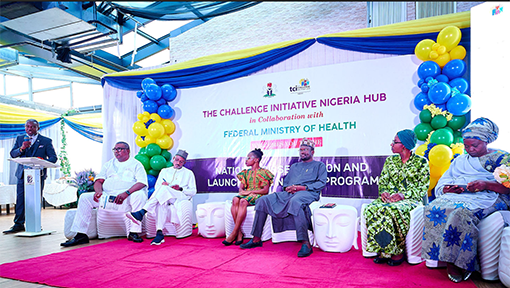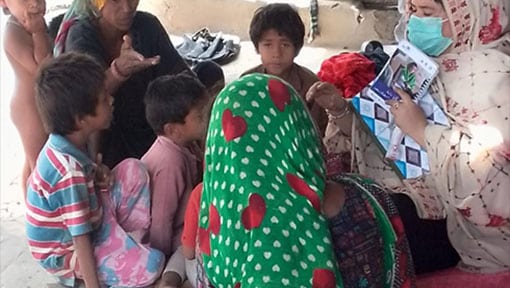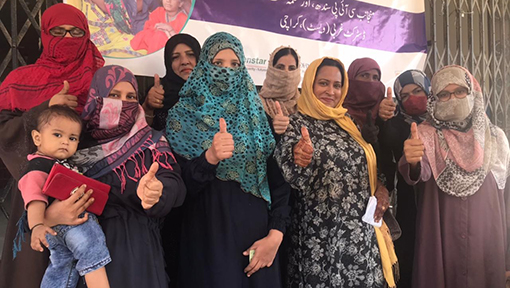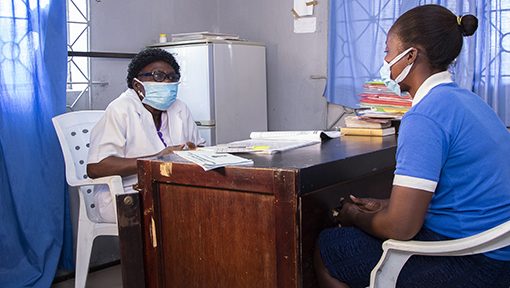Sustainable Family Planning Programs in Nigeria Moves Closer to Becoming a Reality
Contributor: Uduak Chidozie Ananaba, Lisa Mwaikambo, Olukunle Omotoso, Lekan Ajijola, Dorcas Akila, Victor Igharo

Representatives from the local government, advocacy core groups, media and LPAY ambassadors participated in the panel discussion at the dissemination event.
In Nigeria, The Challenge Initiative (TCI) supports state governments to achieve greater self-reliance in scaling up family planning and adolescent and youth sexual and reproductive health (AYSRH) high-impact interventions (HIIs), leading to sustained improvements in urban health systems and increased use of modern contraception especially among the urban poor. States self-select to participate in TCI’s business unusual approach, with engagement averaging about three-and-a-half years from self-selection and start-up to implementation, pre-graduation and graduation.
After five years of continuous technical support and coaching, TCI successfully demonstrated proof of successful scale of its family planning and AYSRH HIIs in 10 Nigerian states. To mark this achievement, TCI held a national dissemination event on June 14, 2022, to disseminate learnings from its partnership with the states that attained self-reliance, foster collaboration between new states and “alumni” states, stimulate networking, and strengthen strategic engagements at the national and subnational levels.
The 10 graduated states shared which HIIs were rapidly scaled up by government, experiences around co-financing in the face of limited domestic financial resources, how states were able to institutionalize the HIIs within systems and policies, and challenges with partnering with TCI and their ability to navigate those challenges. The 10 graduated states are Abia, Anambra, Bauchi, Delta, Kano, Niger, Ogun, Plateau, Rivers and Taraba states.

Panelists from left to right: Dr. Tijani Hussaini, Executive Secretary, Kano State Primary Health Care Management Board; Dr. Agiriye Harry, Principal Secretary, Rivers State Primary Health Care Management Board; Modupe Koko Balogun, LPAY Ambassador of Ogun State; Elizabeth Carr, Media Practitioner from Bauchi State; Dorcas Abu, FP Coordinator for Niger State’s Primary Health Care Development Board; and Barr Hussaini Suleiman Saraki, Secretary of Bauchi State’s Advocacy Core Group.
In describing a key challenge that Rivers state faced and overcame, Dr. Agiriye Harry, Permanent Secretary of the Rivers State Primary Health Care Management Board, shared:
One of our [government’s] weakest points was SBCC [social and behavior change communication] and they [TCI] were able to, apart from strengthening it, get us some community mobilizers which is an innovation we didn’t have before, and we intend to continue with that. We have absorbed the community mobilizers. TCI also introduced us to quality improvement teams, which we converted to WDCs [Ward Development Committees] and will continue with that.”
Expanding upon this, Dr Tijani Hussaini, Executive Secretary of the Kano State Primary Health Care Management Board, shared a learning from Kano state:
We [government] learnt one of the most sustainable ways for ensuring that services continue in our facilities and everyone is aware of what is happening, is the whole site orientation (WSO), where from the gatekeeper down to the Chief Medical Director of the facility are made aware of what is happening with regards to family planning. For us, this is one of those things we will maintain. WSOs changed our perception of capacity building of service providers and the platform involved everyone at the different service delivery points.”
Beyond scaling up family planning and AYSRH HIIs, state governments further elaborated upon notable policy interventions that were instituted under TCI, which will ensure continuous access to quality family planning and AYSRH services. Mrs. Dorcas Abu, FP Coordinator of Niger State Primary Health Care Development Board, shared that several HIIs are now embedded in Niger state’s Annual Operational Plan. Other policy interventions that TCI supported were the development of costed implementation plans (CIPs), domestication of Task Shifting Task Sharing to address gaps in human resources for health and contribute to expanding access to modern contraception, and ensuring equitable access by young people by coaching state government on how to intentionally integrate them within state structures and community governance structures.
Integrating community members to drive health system changes was also highlighted by all members of the panel. Mrs. Abu shared:
What wowed us was the 72-hour makeover. They [TCI] radically transformed facilities in a short period of 72 hours using community artisans…and the lesson we learned is that we can use the little we have and the people in our community to get what we want. Through this process, we have successfully renovated our facilities using the community artisans.”
Modupe Koko Balogun, an LPAY ambassador in Ogun state, added that:
Young people have been integrated into all the committees from the SBCC Committee, health educators committee, budget and planning committee…. We have the skills, we have the language, all we really needed was access to healthcare providers, access to policy, access to information so we could feed it to a wider population.”
The LPAY ambassador of Ogun state acknowledged that TCI provided young people the platform for recognition and acceptance by government and the community. Panelists also cited that the operational structure of TCI which embeds TCI staff within government structures fostered team building and effective transferred knowledge, skills and capacity. They praised TCI’s approach as a sustainable means for strengthening the health system. According to Dr. Tijani:
They [TCI] made sure they looked for offices within and embedded the staff of the Ministry with the TCI team to enable skills and knowledge transfer…. Over the few years we [government] have worked with TCI, knowledge transfer was very strong.”
Expounding on this, Dr. Harry added:
But the most important thing in the state which they [TCI] did which I liked is not necessarily what they [TCI] achieved or what they didn’t achieve. It is the way they worked. The way they were able to work with our team and you couldn’t tell the difference, the way they were able to transfer the technical knowledge they had, the ability to find easier ways to address issues…I think that is the greatest lesson we [government] learned and we are holding down on those things.”
Hearing the dynamic perspectives from the panelists added value to the onboarding of new states, created an atmosphere for interaction, networking and learning as well as addressed uncertainties that newly onboarded states may have related to the TCI model. In addition, the panelists made public commitments on a national setting that they plan to continue financing and implementing TCI’s HIIs.
They also affirmed that they will continue quarterly performance tracking introduced by TCI to monitor program financial investments and leverage facility funds to address family planning needs and ensure family planning commodities are integrated into drug and commodity purchase lists and processes. These are two significant challenges faced across all states, so this commitment and resolution is a sign of a mindset shift in one’s ability to effectively address challenges at the sub-national level.






